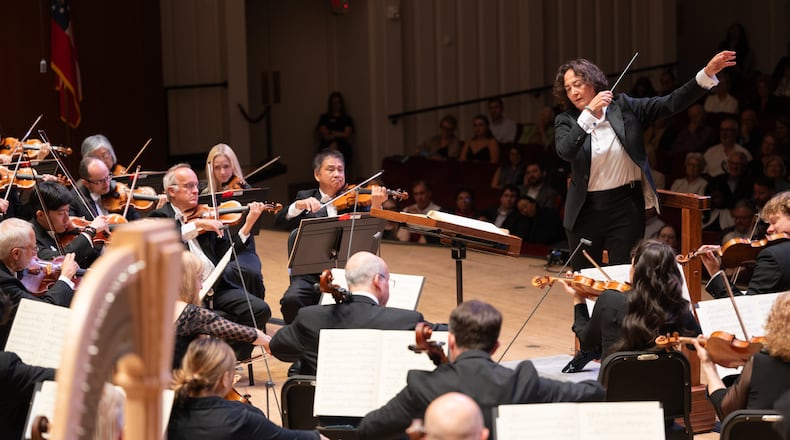Music Director Nathalie Stutzmann opened the Atlanta Symphony Orchestra’s 80th season Thursday with a titanic Mahler symphony that toed the line of musical extremes, serving as a fitting reintroduction to Stutzmann’s orchestra and a season that will see the ASO perform a plethora of capital-C classical works.
Pairing a breezy but magnificently played Schumann cello concerto, featuring guest artist Edgar Moreau, with the monolithic Mahler not only balanced out Thursday’s program but signaled an aesthetic choice for the season: looking back.
The ASO’s recent history with the Schumann cello concerto includes a breathtaking 2017 concert by Steven Isserlis, led by then-music director Robert Spano. A high bar for any guest soloist, indeed. But seven years — and, frankly, anything pre-COVID-19 — could well be a lifetime ago, so another interpretation was well overdue. Fit snugly within the orchestra (concertmaster David Coucheron had to move his music stand slightly to afford Moreau full range of motion) the cellist’s bright, vibrant tone rang out above a well-blended and expressive ensemble. Moreau played with a confident swagger befitting a season opener, and the orchestra responded in kind.
This is a much different ASO than it was in 2017. According to the organization, 15% of the orchestra’s musicians have joined during Stutzmann’s two full seasons at the helm; among the six new hires this season is Cameron Bonner as principal bassoon, replacing Andrew Brady, who is now with the St. Paul Chamber Orchestra, and Andrew Burhans as principal horn, who joins an utterly transformed horn section.
For the concert, Stutzmann nestled the cello section next to the violas, surrounding them on both sides with violins. This gave the cellos more presence in both the Schumann and the Mahler, with basses arrayed on risers behind the enlarged orchestra during the latter. Trying to find the right seating chart — musicians on risers, different instrument mixes within the ensemble — is an ongoing project for Stutzmann, but it’s an exercise that has served the orchestra well in a hall that is far from an acoustic marvel.
Principal guest conductor Donald Runnicles used Mahler’s Symphony No. 5 as his farewell to ASO patrons in 2023; he memorably brought the conductor’s first symphony to the orchestra the season before. Mahler’s voice seems to be equally important for Stutzmann. (She is leading the ASO and mezzo-soprano Fleur Barron in Mahler’s “Des Knaben Wunderhorn” next week.) Her post-intermission interpretation of Mahler on Thursday began with quiet, mysterious harmonies and crackled with energy during the second movement, a bright and busy folk dance. Gracefully bouncing at the podium while raising a balletic arm, she willed the orchestra to twirl along through the dance sections. From there to the heraldic horn choir in the closing passages of the fourth movement, the ASO sounded like it could contend with the best orchestras around today.
I can’t recall much of anything about the first time I heard the ASO in Symphony Hall (could it have been Runnicles standing at the podium?), but hearing the orchestra in its first live performance after COVID-19 is etched in my mind. The thrill of hearing old music teeming with life in a suddenly vibrant venue resurfaced during Mahler’s symphony. I hope that feeling returns many times during the orchestra’s 80th year.
Atlanta Symphony Orchestra
8 p.m. Sept. 21. $64-$165. Symphony Hall, 1280 Peachtree St. NE, Atlanta. 404-733-5000, aso.org.
About the Author
Keep Reading
The Latest
Featured



